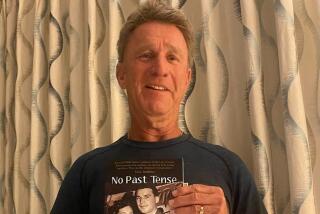Reunited War Buddies Had Been Closer Than They Knew
- Share via
One came to the United States by ship in 1947, the other by plane in 1959. The two men whose friendship blossomed during the Holocaust eventually settled in Los Angeles just miles from each other, but neither of them knew it.
On Monday, Victor Bilski, 80, and Fred Kort, 77, were reunited after 56 years.
“It’s amazing,” Bilski said at Kort’s Beverly Hills home. “I couldn’t sleep last night.”
The reunion came about when an old photograph of Kort and Bilski ran in April in a Times story about Kort’s experience as a Holocaust survivor. Bilski’s son, who lives near Bilski in Valley Village, recognized his father in the photo.
They contacted Kort through his toy company, Imperial Toys. Kort was on business in Asia, but the men talked several times and arranged to meet.
“It shocked me to earth,” Kort said of hearing that Bilski had called. “It was really unbelievable.”
Recalling War’s End
At a table spread with news clippings and photo albums filled with yellowing pictures, the men recalled the last days they had shared as friends in 1945.
The war had just ended and the two men, walking down one of Poland’s main streets, were ecstatic. Kort fired his service gun in celebration, struck an electric car cable overhead and put the transportation system out of service for the day, Kort said as both laughed.
It was their last youthful misadventure. Kort soon left Poland for his native Germany, and ultimately the United States, where he started a toy manufacturing company in Los Angeles.
Bilski, a Polish citizen, eventually went to Sweden. He then lived in Australia and a number of U.S. cities until 1967, when he came to California and worked in restaurants.
The two had met in 1939, when German troops forced Kort, then 16, and Bilski, then 18, into the Jewish ghetto in Warsaw. Bilski was one of the few young people there who could communicate with Kort in his native German. They became friends as they worked side by side on the railroads chiseling ice from frozen tracks.
Kort and Bilski met daily to review the events of the war. “All the youth would gather together,” Bilski said. But that became difficult as “the ghetto started closing up and nobody could get around.” One day, Bilski went to look for his friend and learned he was gone. “One day he just disappeared,” Bilski said. “He just left.”
Kort had fled the ghetto only to later confront a series of labor camps and finally Treblinka, a labor and death camp from which he escaped just before the war ended.
Reconnecting in Poland
Meanwhile, Bilski and his brother were briefly sent to Auschwitz but were soon transferred to a labor camp. Bilski worked as a blacksmith until the camp was liberated.
At the war’s end, the two men reconnected in Poland after Kort, then a member of the Polish Army, saw Bilski’s name on a survivor list. But the reunion was short-lived. Just a few months later, Kort told Bilski that he was leaving for Germany. Bilski gave him a warm coat and some money and wished his friend well.
For at least 30 years they have both lived in California. Bilski even worked the counter at Canter’s restaurant, where Kort and his wife often stopped for corned beef sandwiches. “He could have walked by me and I never would have recognized him,” Bilski said.
Their memories, long buried and somewhat faded, kept them talking well into the afternoon Monday.
Kort said they will meet again next week, away from friends, family and media.
“We are going to see each other a lot,” Kort said. “We were not just acquaintances, we were very good friends.”
More to Read
Sign up for Essential California
The most important California stories and recommendations in your inbox every morning.
You may occasionally receive promotional content from the Los Angeles Times.













